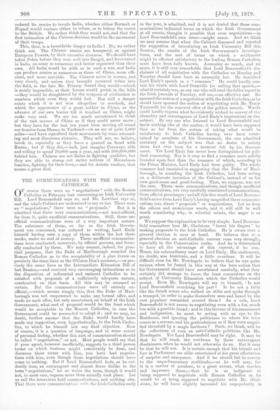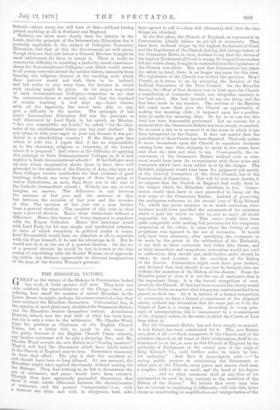THE COMMUNICATIONS WITH THE IRISH CATHOLICS.
OF course there were no " negotiations " with the Roman Catholics in February last concerning an Irish University Bill, Lord Beaconsfield says so, and Mr. Lowther says so, and the whole Cabinet are understood to say so too. There were
no " negotiations," there were no " proposals." But it is admitted that there were communications,—not semi-official, far from it, quite unofficial communications. Still, these un- official communications were of a very important nature. The substance of them, so far as the Irish Govern- ment was concerned, was reduced to writing, Lord Emly himself having seen a copy of them within the last three weeks, under no seal of secrecy. These unofficial communica- tions were conducted, moreover, by official persons, and form- ally conducted by them. We may assume, indeed, for prac- tical purposes, that the Duke of Marlborough sounded the Roman Catholics as to the acceptability of a plan drawn on precisely the Erame lines as the O'Conor Don's measure,—on pre- cisely the same lines as the Intermediate Education Bill of last Session,—and received very encouraging intimations as to the disposition of influential and eminent Catholics to be satisfied with proposals of a sufficiently adequate nature, constructed on that basis. All this may be assumed as certain. But the communications were all entirely un- official,—which means simply this, that the Duke of Marl- borough was not empowered to make any formal offer, and made no such offer, but only ascertained, on behalf of the Irish Government, what sort of proposal would be the least which would be acceptable to the Roman Catholics in case the Government could be persuaded to adopt it ; and we may, no doubt, further assume that the Duke would hardly have made any suggestion, even hypothetically, to the Irish Catho- lics, to which he himself saw any final objection. Now of course, it is a question of language, and to some extent of personal feeling, whether this sort of communication should be called "negotiation," or not. Most people would say that if your agent, however unofficially, suggests to a third person terms on which business might conceivably be done, and discusses these terms with him, you have had negotia- tions with him, even though those negotiations should have come to nothing. But if Lord Beaconsfield feels, as he evi- dently does, an extravagant and almost fierce dislike to the term "negotiations," let us waive the term, though it would not, to most ears, express more than actually took place. Let us call the interviews held. communications, and nothing else. That there were communications with the Irish Catholics early in the year, is admitted, and it is not denied that those com- munications indicated terms on which the Irish Government at all events, thought it possible that even negotiations—in Lord Beaconsfield's own sense—might ensue. And we think we may assume that when the Cabinet discussed and rejected the suggestion of introducing an Irish University Bill this Session, the results of the Irish Government's investiga- tions, and the sort of terms on which a settlement might be effected satisfactory to the leading Roman Catholics, must have been fully known. Assuming so much, and no more, it is still very remarkable that Lord Beaconsfield's dis- claimer of all negotiation with the Catholics on Monday and Tuesday should have been so unusually hot. He described Lord Emly's speech as a "romance." He could hardly con- tain his wrath with Lord Granville for calling that speech,— what it certainly was, as any one who will read the fuller report in the Irish journals of Tuesday, will see,—an effective one. He spurned the notion of a negotiation with the Irish Catholics, as he would have spurned the notion of negotiating with Mr. Tracy Turnerelli for the renewed offer of the golden wreath. Words could hardly express what he evidently wished to convey of the absurdity and extravagance of Lord Emly's impressions on the subject. By any one who listened to Lord Beaconsfield and knew nothing else of the matter, it would have been supposed that so far from the notion of asking what would be satisfactory to Lida Catholics having ever been enter- tained by members of his Government, the one admitted certainty on the subject was that no desire to satisfy them bad ever been for a moment felt by his Govern- ment. Yet Lord Emly has never been distinguished for poli- tical romancing. Nor is it easy to find a romance more solidly founded upon fact than the romance of which, according to the Prime Minister, Lord Emly had been guilty. The whole romance had consisted in suggesting that the Duke of Marl- borough, in sounding the Irish Catholics, had been acting on a deliberate intention of the Cabinet's, instead of on his own good-sense and good-feeling. That, we suppose, was not the case. There were communications, and though unofficial communications, yet very carefully considered communications, from official personages; and all this dire wrath of Lord Beacons- field's arises from Lord Emly's having magnified these communi- cations into direct " proposals " or negotiations. Let us drop the odious and unwelcome words, and it will still be well worth considering why, in celestial minds, the anger is so great.
We suppose the explanation to be very simple. Lord Beacons- field remembers how Mr. Gladstone "burnt his fingers" by making proposals to the Irish Catholics. He is aware that a general election is near at hand. He believes that at a general election an anti-Catholic current runs very strongly, especially in the Conservative ranks. And he is determined to have all the advantage of this current, if he can. Hence, his extraordinary onset on Lord Emly. His excitement, no doubt, was histrionic, and a little overdone. It will be difficult even for Mr. Newdegate to believe that he was quite serious, when he fumed in this way at the bare notion that his Government should have ascertained carefully, what they certainly did manage to know, the least concessions on the subject of University Education which the Catholics would accept. Even Mr. Newdegate will say to himself, Is not Lord Beaconsfield overdoing his part ? Is he not a little like the Greek actors who walked on stilts and spoke through a trumpet,' in order to make themselves seen and heard by the vast populace assembled around them As a rule, Lord Beaconsfield is not averse to negotiating even with a foe, much less with a possible friend ; and in this fervour of his amazement and indignation, he must be acting with an eye to the Residuum, and ignoring the politicians to whom his voice comes as a scream, and his gesticulations as if they were magni- fied threefold by a magic lan thorn!' Such, we think, will be the reflections of even an anti-Catholic politician like Mr. Newdegate. Yet Lord Beaconsfield may be right. It may be that he will reach the residuum by these extruvagant disclaimers, when he would not otherwise do so. But it may be that he will not. It is certain enough that his friends and foes in Parliament are alike entertained at his gross affectation of surprise and annoyance. And if he should fail to convey to the unparliamentary multitude,—as he well may, for it is a matter of accident, to a great extent, what reaches and impresses them,—that he is as indignant at being supposed to negotiate with Roman Catholics as be would be at being supposed to negotiate with Mr. Glad- stone, he will have slightly increased his unpopularity in
Ireland—where every one will hear of this—without having gained anything at all in Scotland and England. Nothing can show more clearly than the debates in the Lords, that the principle of the Intermediate Education Act is perfectly applicable to the subject of Collegiate University Education, and that of this the Government are well aware, though they see that just before a General Election it might be most unfortunate for them to accept it. There is really no conceivable difficulty in inventing a perfectly sound conscience- clause for Denominational Colleges,—one which would ensure to all young men who attend the secular classes, immunity from learning any religious element of the teaching with which their parents would not wish them to be imbued, and fair notice to stay away from the lectures in which such teaching might be given. As for proper inspection of such denominational Colleges,—inspection to see that the conscience-clause is carried out, and that the standard of secular teaching is well kept up,—Lord Cairns, with all his ingenuity, has never been able to sug- gest a difficulty in the matter. The principle of last year's Intermediate Education Bill was the principle so well illustrated by Lord Emly in his speech on Monday. "Are you responsible, my Lords," he asked, "for the char- acter of the establishment where you buy your clothes ? Do you refuse to take your sugar or your tea, because it was pro- duced in a slaveholding country ? If the State gets that which it asks for, I repeat that it has no responsibility as to the character, religious or otherwise, of the factory where it is prepared." And where is the difficulty of applying this principle to Irish Denominational Colleges as it is now applied to Irish denominational schools If the Colleges send up men whose examination shows them to have been well grounded in the subjects of the Faculty of Arts, why may not these Colleges receive results-fees for that evidence of good teaching, without any more danger of those fees going to endow Catholicism, as such, than there was in the case of the Catholic intermediate schools Nobody can say, or even imagine, an answer. The difference is not between the measure of last year and the measure of this, but between the occasion of last year and the occasion of this. The occasion of last year was a year further from a general election. ■ The occasion of this year is close upon a general election. Hence these distinctions without a difference. Hence this- horror of being supposed to negotiate with the Roman Catholics. Hence this histrionic wrath with Lord Emly for his very simple and unaffected reference to facts of which everybody in political circles is aware. Lord Beaconsfield would have no objection at all to negotiate with the Pope himself, if he saw his advantage in it. But be would not do it on the eve of a general election. On the eve of a general election he would be lost in horror at the bare notion of negotiating with the Scarlet Woman, or of approach- ing within any distance appreciable to electoral imaginations of the hem of the Scarlet Woman's garment.



































 Previous page
Previous page